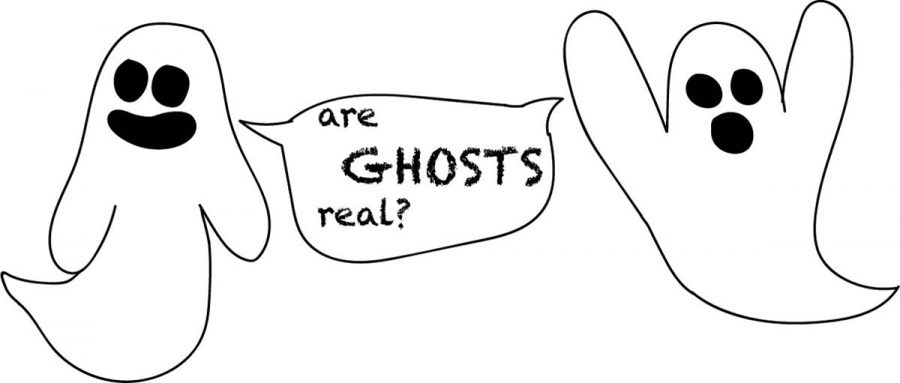Are ghosts real?
Spectator staff members debate whether ghosts are real or not, just in time for Halloween
Ghosts are real
You hear a creak around the corner. A twig snaps outside, but nobody is there. Leaves rustle in the street, but there is no wind or movement around to cause it. These things seem natural, but if you think about it, are they?
The only explanation for these supernatural occurrences is the presence of ghosts.
Growing up in an old town, there were ample opportunities for my friends and me to run into ghosts. In fact, the park right across the street was home to a ghost in a flannel shirt. He hung out in the bathrooms, became angry one day and destroyed the mirror in the ladies’ bathroom, covering it with scratches and taking away all of its shine.
To this day the mirror has not been replaced.
Ghosts are real, and we must admit it because of haunted houses, which are often located in the heart of downtown in old cities.
Look at Milwaukee. A serial killer could be lurking just around the corner, ready to kill the next victim and dump them into Lake Michigan, where city workers are still pulling bodies.
Is it a person, or is it a ghost, haunting people into committing gruesome crimes?
Let’s just face the facts: It’s a ghost. Spirits exist in the atmosphere, clinging onto souls worthy of possession.
Running into ghosts isn’t even that difficult. Some buildings have a certain feel to them, sending chills through your skin. Although you convince yourself the chill is a breeze, it could be a spirit, clinging on to the nearest source of human flesh.
The existence of ghosts may seem doubtful because you can’t always see them. But their presence could haunt you for years to come if you don’t believe.
– Elizabeth Gosling, Currents Editor
Ghosts are not real
The human brain is powerful. It can absorb knowledge, spin dreams, compose music and solve complex problems all in a heartbeat. It is also vast: According to Discover Magazine, there are as many neurons in the brains as there are stars in the Milky Way.
With all those neurons, it’s no wonder humans are so imaginative that they often confuse fantasy with reality.
Take ghosts, for example. Ghosts are not real, yet a 2009 Pew Research Center survey found one in five American adults believe they’ve seen or been in the presence of a ghost.
Human belief in the supernatural dates back to first century C.E. when Roman scholar Pliny the Younger wrote his own ghost story, according to the History Channel.
As the world progressed, the entertainment industry profited off — and probably deepened — supernatural obsession.
An example is the show “Ghost Hunters,” which, according to Live Science, never found hard evidence that ghosts exist in all of its 12 seasons.
When it comes to ghosts, people rely on their own experiences — which are not peer-reviewed — to reinforce their beliefs.
“People assume that if they can’t explain something in natural terms, then it must be something paranormal,” Christopher French, a professor of psychology and head of the Anomalistic Psychology Research Unit at Goldsmiths, University of London, told The Atlantic.
I blame the brain for imaginatively turning creaks, drafts and “stolen” keys into paranormal verification.
Maybe people today don’t care about peer-reviewed scientific evidence, and would rather go with their guts.
– Clara Neupert, Staff Writer

Neupert is a fourth-year journalism student at UW-Eau Claire. She is the executive producer of Engage Eau Claire on Blugold Radio Sunday. In her spare time, Neupert's working on becoming a crossword puzzle expert.



Eli • Sep 30, 2022 at 11:07 am
are ghosts real yes or no
zoe • Nov 26, 2020 at 2:03 pm
You think that’s scary when I was asleep there was a noise I thought it was just my brother so I went outside to get him look up girl in my tree with a dress white ever since then i’v been scared of wight dresses And from then and now It’s been hunting me since ps.I was 8
Javid • Sep 22, 2020 at 8:32 am
I was watching mara
Javid • Sep 22, 2020 at 8:30 am
I lived by a hunted house before and i was riding my bike and then I got shot up into the air and nothing was holding me i could not move i was so scared
Johno • Jul 6, 2018 at 5:43 pm
My name is John and I have seen a ghost loads of times the same ghost I keep it every time I go outside for some fresh air but strangely enough this happens every time I’m outside I think it might just be the spirit of my grandad who sadly died last year of cancer it’s nice to know he’s always there at the side of me and he all ways sits next to me when me and parents go out for dinner everywhere with my family and he always sits next to me in the car when we go anywhere hoe strange is that?
Yourmom123 • May 31, 2018 at 12:46 pm
Ghosts are legit fam
Random • May 19, 2018 at 7:32 pm
Do you ever feel unsafe,in some rooms in your house hold? If yes look around and if you see a mirror faceing a mirror it’s consiterd a ghost portal
Linda • May 8, 2018 at 1:06 pm
I think ghosts are real because I’ve been living a haunted house since I was really little and many things have happened there. There was this one night i was only 15 and me and my parents were hanging out. we were going to have a family dinner and then watch a movie. While my mom was making dinner all the lights suddenly went out and it wasn’t raining or storming outside. my mom was cutting a pepper when the lights went out and it was dark out and we couldn’t see anything, but all of a sudden i heard my mom scream. she cut her wrist with the knife. my dad was then screaming at me to go upstairs and get a towel and a flashlight. so i did and when i went up the stairs i saw that my parents room light was still on but i thought it was a back out. I slowly walked towards my parents room and nothing happen so i walked inside. the door slammed shut and the lights went out. I was screaming and pounding on the door and it was so cold in the room i could see my own breath. After a few minutes of screaming and pounding on the door the door flew open. And then i noticed all the lights were on down stairs so i went down stairs and i saw my mom and dad both sitting on the couch. and i asked them what they were doing and they said we were going to watch the movie and i also saw that my moms cut was gone. Then later that night when i was trying to fall asleep i kept hearing whispers but i could never make out what they were saying. After a lot of years later my parents passed away and i still live in the house and just recently weird things have started to happen again.
Lilly • Jun 3, 2018 at 1:46 pm
Wow! That’s scary. I’ve had experience with ghosts too. One night I was sleepingvin myvmins room on the floor,and there was a window behind the bed. I was trying too go to sleep, when I saw a shadow over the TV. In my mind I was thinking it was just my imagination, but it wasn’t. 5 minutes later it went away,but it kept haunting me for 3 months.
Devon Lask • Oct 23, 2017 at 8:33 pm
Ghosts do not do these unexplainable things, aliens do!
Linda • May 8, 2018 at 1:07 pm
I would disagree